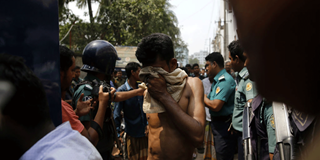While the death penalty for drugs has existed in Bangladesh for decades, it has rarely been used. This could change dramatically if Parliament approves a government bill that could subject people who use drugs and low-level dealers to the ultimate punishment.
LONDON – The audio quality is poor and the sound of gunshots muffled, but the agony in Ekramul Haque’s voice is unmistakable. On May 26, while speaking with his family by phone, Haque, an elected official in southern Bangladesh, was gunned down by police in an apparent extrajudicial killing.
Bangladeshi authorities insist Haque was a drug dealer who died in an exchange of gunfire, but the audio evidence – captured by his wife as she listened to her husband die – suggests that the officers involved killed him and then planted drugs at the scene. The recording casts a disturbing light on Bangladesh’s new drug-control strategy.
Since May, when Prime Minister Sheikh Hasina revamped her government’s war on drugs, an estimated 25,000 people have been arbitrarily imprisoned, and at least 200 have died in alleged shootouts. The parallels to President Rodrigo Duterte’s brutal drug crackdown in the Philippines are chilling. There, human rights are routinely violated and more than 20,000 people have been slaughtered since 2016. While Duterte’s campaign has drawn international condemnation, Hasina’s purge has been subject to less scrutiny.

LONDON – The audio quality is poor and the sound of gunshots muffled, but the agony in Ekramul Haque’s voice is unmistakable. On May 26, while speaking with his family by phone, Haque, an elected official in southern Bangladesh, was gunned down by police in an apparent extrajudicial killing.
Bangladeshi authorities insist Haque was a drug dealer who died in an exchange of gunfire, but the audio evidence – captured by his wife as she listened to her husband die – suggests that the officers involved killed him and then planted drugs at the scene. The recording casts a disturbing light on Bangladesh’s new drug-control strategy.
Since May, when Prime Minister Sheikh Hasina revamped her government’s war on drugs, an estimated 25,000 people have been arbitrarily imprisoned, and at least 200 have died in alleged shootouts. The parallels to President Rodrigo Duterte’s brutal drug crackdown in the Philippines are chilling. There, human rights are routinely violated and more than 20,000 people have been slaughtered since 2016. While Duterte’s campaign has drawn international condemnation, Hasina’s purge has been subject to less scrutiny.